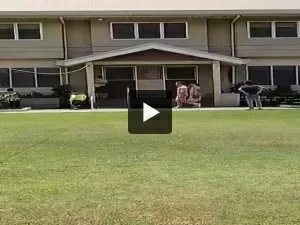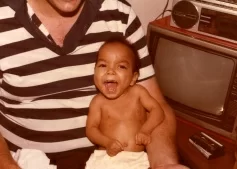 without a thought on my part. But Luke came to my mind yesterday and I looked up some information on him and discovered that his birthday had just passed. I found this old article that I wrote about Luke a few years ago. I thought I'd share it again. I am convinced that there are important and significant lessons we can learn from his life, and that I need to regularly share what I think they are. I hope you enjoy this!
without a thought on my part. But Luke came to my mind yesterday and I looked up some information on him and discovered that his birthday had just passed. I found this old article that I wrote about Luke a few years ago. I thought I'd share it again. I am convinced that there are important and significant lessons we can learn from his life, and that I need to regularly share what I think they are. I hope you enjoy this!The mysteries of God are a part of the Christian life that can often lead to confusion, doubt and even discouragement for believers.
- For some, it's a pride thing. We want to have answers – we want to understand, to be able to grasp the complexities of Biblical truth and God's plan for mankind.
- For some, God's mysteries – the unexplained things of life – are stumbling blocks to faith:
1. Why do bad things happen to good people?
2. Why does He allow pain, suffering and evil to thrive in our world?
Several months ago we were witnesses to the aftermath of the tragedy in Pennsylvania involving the Amish community, where, good, decent, hard working, non violent people were subjected to unspeakable cruelty towards their children. How can this happen?
3. One of our CSC children, who grew up in the worst poverty imaginable in Cebu City, was adopted into a family in the United States several years ago. Well meaning people would tell her how lucky she was and how God obviously had a wonderful plan for her life. She had a hard time with that and would sometimes ask her parents, "But what about all the kids who are still there, who weren't adopted, and who are still suffering and dying? What is God's wonderful plan for their lives? Why me and not them?
For many of us, we celebrate the goodness of God in our lives, we praise him for his healing, for material comforts, for blessing our efforts – even as we observe people who remain sick or disabled, who suffer in poverty – those who efforts and initiatives end in disappointment and ruin.
There are two extremes in terms of people's reactions to the things about God and life that are not understood.
1. There are those who try in vain to grasp the ungraspable – to be able to reduce the mysteries to understandable formulas or explanations. I remember a young seminarian who came to Cebu and who filled the pulpit of our church on a Sunday evening. He preached for an hour on the "peace of God that passes all understanding." Perhaps he felt that if he preached long enough he could crack that nut and open our understanding!
We all know those who have reduced the book of Revelation to precise charts and timetables, giving us easy to understand categories for all of human history and, most especially, the times to come.
2. A second category are those who shake their heads and say, "We'll only know these answers when we get to heaven." They suspend inquiry, not bothering to seek answers to the perplexing questions of life.
Living and working in a Third World country like the Philippines brings some of these mysteries to the front of our lives. Poverty, and all that goes with it, is "in your face." People often ask me "How do you like living in the Philippines?" That's a tough one to answer. Life anywhere has its highs and lows. Some days are great, others are difficult. I often answer this way:
1. When I'm sitting down to a nice breakfast I am aware that, within a few meters of my house are families that have no breakfast.
2. When I'm driving to the office or the Shelter I often pass people walking along the road who, for lack of a few cents can not even afford public transportation and must walk.
3. When I stop to buy medicine for my family or the CSC kids, there are people standing nearby whose children are dying for lack of that very same medicine.
Why am I blessed and they are not?
I recall a conversation with a missionary a few days after Cebu was hit by a strong typhoon. Many of our CSC workers lost their roofs or their entire homes. The houses of the poor were devastated by the high winds and torrential rains. The missionary said that it had been such a miracle how God spared the missionary homes from damage, holding his hands of protection around us during the storm. I remember wondering whether it wasn't more a matter of our having cement houses and strong metal roofs.
Why did our CSC kids have to suffer so much? And how much more, those who live on the street and cannot be admitted to CSC?
These are tough questions. When it comes to trying to understand our own suffering, the Bible gives some answers. For example, Romans 5:3-4 tells us that suffering produces perseverance, perseverance character, and character, hope. And the Bible gives us additional hope that we will someday come to see God's purpose and mysteries:
"But now we see through a glass dimly, but then face to face."
And we hear the testimonies of Christian brothers and sisters who have lived through terrible times and have turned negatives into positives in their lives.
Several months ago I was attending a conference in Bismark, North Dakota. One of the featured speakers was Steve Saint, Steve's father, Nate Saint, was one of the five missionaries killed in 1956 by Aucan warriors in Equador. Steve told about what that tragic day meant to his family, and what it was like when his dad, his hero, didn't come home that day. We saw video of his current family life, and saw a man who was interacting with Steve's children, and who was being referred to as "Uncle." It turns out that this was the very man who had killed Steve's father, who had come to know Jesus and had experienced the forgiveness of God and of the Saint family and now was a part of their family – an amazing story of how good things had come out of tragedy and suffering.
So the clear message is that God has a plan for our lives, we will discover that plan in the right time. He is writing our life's stories, but some of the chapters are difficult ones.
We can understand this. We can, when aided by the Holy Spirit, see how difficulties and suffering are part of a purification process for us, and that we, like Job, will eventually be better people for it.
But what about people who, because of major disabilities, are unable to understand their situation, unable to discern the hand of God or his plan for their lives. Where is the purification and growth and ultimate value for these people? What could God's purpose possibly be?
Back on 1982 a baby was born in a charity ward in a small hospital in Cebu City. 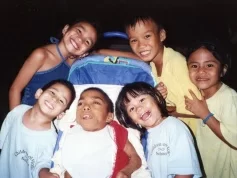 The baby underwent cardiac arrest during birth and was without oxygen for an extended time. Unlike many cases of charity patients, the hospital staff decided to resuscitate the baby, even after he had suffered massive brain damage and cerebral palsy. The baby's mother abandoned him in the hospital, and after a couple months Luke was referred to CSC. When we took him in he appeared to be a bouncing baby boy. We did not know that he would not develop physically beyond about a year and a half, or mentally beyond a few months. Luke would never speak, nor have voluntary movement of his arms or legs.
The baby underwent cardiac arrest during birth and was without oxygen for an extended time. Unlike many cases of charity patients, the hospital staff decided to resuscitate the baby, even after he had suffered massive brain damage and cerebral palsy. The baby's mother abandoned him in the hospital, and after a couple months Luke was referred to CSC. When we took him in he appeared to be a bouncing baby boy. We did not know that he would not develop physically beyond about a year and a half, or mentally beyond a few months. Luke would never speak, nor have voluntary movement of his arms or legs.
Luke became a fixture at CSC. For over 23 years he was an integral part of our lives and a symbol of CSC and what we are all about.
Many times Luke would be hospitalized – often due to upper respiratory infections. He fought for his life many times. There were at least a dozen times when we were sure that he would die. The doctors had told us that he wouldn't make it past five years old. Then they revised it to nine, then 11 – certainly he wouldn't reach his teenage years.
One time, when Luke was critically ill our staff met to pray and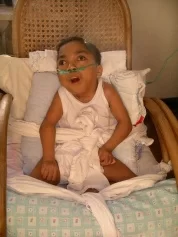 I asked them to reflect on his life. Here is why: I believe that God had a purpose for Luke's life when he created him. I believe that He uses people like Luke to teach us important things. But here is the rub: If we don't spend time reflecting on these lessons, then Luke's life is useless. Its up to us to allow God to make sense of Luke's life.
I asked them to reflect on his life. Here is why: I believe that God had a purpose for Luke's life when he created him. I believe that He uses people like Luke to teach us important things. But here is the rub: If we don't spend time reflecting on these lessons, then Luke's life is useless. Its up to us to allow God to make sense of Luke's life.
And what are the lessons that we found? What has God taught us through his life?
1. First, life is precious. Even though he had nothing to live for, from the world's point of view, Luke clung to live almost ferociously. Some of us who have much more to live for take life casually, we take life for granted. Not Luke. Every day was a struggle. Every breath had to be fought for. Life is a gift from God and we should treat it carefully.
2. God has provided us with opportunities, through Luke's life, to minister to him in significant and life-saving ways. He has provided an avenue for us to live out the biblical mandate to minister unto the "least of these," because, truly, Luke was in that category. Hundreds of people have been given a blessing to participate in the support of CSC that reaches out to children like Luke and many others with other special needs.
3. In so doing, He has given us a chance to show others a Godly value system that doesn't reserve love and attention for those who have something to give back, or who have "potential" or a bright future. For many people who live in a developing country, where resources are limited, this has been a difficult lesson to learn. How could we justify spending so much money for Luke's hospitalization when other, "normal" kids needed care? Luke's life gave us the opportunity to teach about the value of life and about how God looks at all of us.
4. Luke has been a tremendous ambassador for CSC. People around the world remember observing the loving care that he received by our staff and workers. They remember his famous smiles. They may quickly forget the names of the staff or other children, but they remember Luke. "How's Luke doing?" we get asked wherever we go to talk about the ministry of CSC. And our care of Luke helps us explain the true nature and core values of our work in the Philippines.
5. Luke has been a safety valve for those that had an opportunity to know him. My job as Field Director of CSC involves lots of administrative chores, like making budgets, government relations and various kinds of problem solving. There are days when I get stressed out and start to feel the weight of the world on my shoulders. But all I needed to do is to drive a few short miles to where Luke lived, to hold him in my arms, and I get a clear picture of what real struggles are all about. My struggles paled in comparison to what Luke faced every day. Self pity may be easy for some people, but those that knew Luke have no excuse for feeling sorry for themselves. What a great gift that was to all of us.
A little over a week before we left Cebu, Marlys called me on my cell phone and told me that I should get to the hospital quickly, as Luke wasn't doing well. He had been hospitalized for over a week and his breathing was bad. I had gotten messages similar to this one throughout Luke's life, so I went to the office and took care of a few things. But the Lord laid it on my heart to go see Luke and when I entered his room his breathing was extremely labored. He looked different than I had ever seen him, and it became clear that he was dying. I sat down next to him, kissed him and looked into his eyes. For 23 years we had loved this boy. It wasn't easy to say goodbye. I said to him, "Luke. You can go. Go to be with Jesus, Luke. I love you." Within a couple of minutes Luke took his last breath. 23 years of pain, suffering, limitations, hospitalizations, forced breathing, skin rashes and infections were over. We would never see Luke's smile again.
As Luke was dying in that hospital room, I made a promise. I'm not sure if I was making a promise to Luke, to God or to myself. But I decided then and there that I was going to talk about Luke on our coming furlough. I believed then and do now, that the church of Jesus Christ needs to hear about Luke, that the lessons of his life are important ones. Many Americans are complainers - full of self pity. People who have so many material comforts are unsatisfied. American discourse is increasingly a chorus of victim and entitlement claims. Charles Sykes, in his book "A Nation of Victims: The Decay of the American Character" states that, "in a nation where everyone is a victim, no one is a victim." In our preoccupation with our own needs we have a hard time seeing the needs of others – people like Luke.
In his song "God Help the Outcasts," the Hunchback of Notre Dame poses several difficult issues:
I don't know if there's a reason
Why some are blessed, some not
Why the few You seem to favor
They fear us, flee us,
Try not to see us.
The first part we have already examined. The second is our call to arms. "Why the few You seem to favor, they fear us, flee us, try not to see us."
I don't know what factors might make it difficult for us to see the needs of society's outcasts. Perhaps we are too busy. Maybe our personal and church calendars are so full that there just isn't room for Luke, or the man who had fallen to thieves at the side of the road, to break into our day. Maybe we are numbed or fatigued by the needs of others, or simply overwhelmed by the circumstances of our own lives. Maybe we have become cynical. "Why did that guy travel this road at this time carrying that amount of money? He deserves what he got!"
Maybe, just maybe, Luke can help cut through the apathy, the self-centeredness and cynicism of our lives. He was a person with significant needs that he didn't cause. He was totally dependent on others to live. His life had none of the possibilities and opportunities that we take for granted every day. He needed us so very much. Maybe Luke can serve as a symbol of many others that we come into contact with. Maybe Luke can help us rescue our lives.
"The Bow and the Arrow"
Children are explorers. Curiosity often leads them to peek  inside the doorknob's key hole; enthralls them to touch a squealing kettle; and ferry their feet into places where they are not allowed to be. Often, boundaries are broken.
inside the doorknob's key hole; enthralls them to touch a squealing kettle; and ferry their feet into places where they are not allowed to be. Often, boundaries are broken.
Children are expressive. Emotions often steer their ship as they navigate their social world. They jump, giggle, grin, and laugh when happy. A frown, a downturned face, and a shoulder-drop paint their sadness. Talking back, kicking the wall, shutting down, spitting, throwing things, and crying are the easiest cards to pull out when they are angry. Often, adults' patience is challenged.
Children, most of the time, do not listen, nor take heed of instructions and reminders; they have a loose grip of morality that even memory verses fall short of reminding them to be good. But this does not mean we stop teaching them to be kind. This is to remind us that children are fallible and that they do not have the skill sets to fully self-manage; even adults have difficulty regulating themselves, too. And children who misbehave a lot are often painted with a different color palette, viewed as a problematic child.
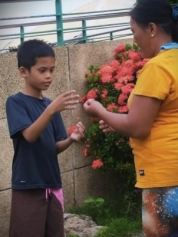 At CSC, children do not only go through these developmental obstacles. They are also bringing with them their adverse experiences. For some children, this baggage magnifies their difficulty to self-regulate. Without a proper lens, dealing with these children might be quite challenging. As adults, the common response is to control these behaviors but with the aid of Trauma Informed Care, houseparents, caregivers, and other staff have a better understanding of the underlying factors of such behaviors. Rather than seeking control, comfort is offered. Rather than spending time preaching the rules and whatnots, cultivating a relationship is the focus. Rather than seeing the child as problematic, the child is seen as a work in progress, still growing to reach his/her full potential, and to give the child a chance to lead a more meaningful life. Through Trauma Informed Care, we are always reminded with how Khalil Gibran viewed how children should be guided. In his poem, he said:
At CSC, children do not only go through these developmental obstacles. They are also bringing with them their adverse experiences. For some children, this baggage magnifies their difficulty to self-regulate. Without a proper lens, dealing with these children might be quite challenging. As adults, the common response is to control these behaviors but with the aid of Trauma Informed Care, houseparents, caregivers, and other staff have a better understanding of the underlying factors of such behaviors. Rather than seeking control, comfort is offered. Rather than spending time preaching the rules and whatnots, cultivating a relationship is the focus. Rather than seeing the child as problematic, the child is seen as a work in progress, still growing to reach his/her full potential, and to give the child a chance to lead a more meaningful life. Through Trauma Informed Care, we are always reminded with how Khalil Gibran viewed how children should be guided. In his poem, he said:
"...You may give them your love but not your thoughts,
For they have their own thoughts.
You may house their bodies but not their souls,
For their souls dwell in the house of tomorrow, which you cannot visit, not even in your dreams.
You may strive to be like them, but seek not to make them like you.
For life goes not backward nor tarries with yesterday.
You are the bows from which your children as living arrows are sent forth.
The archer sees the mark upon the path of the infinite, and He bends you with His might that His arrows may go swift and far.
Let your bending in the archer's hand be for gladness;
For even as He loves the arrow that flies, so He loves also the bow that is stable."
Khalil Gibran, excerpt from On Children
One Light Tube At a Time

Within the borders of the shelter, the facilities maintenance team plays an essential role in ensuring the physical environment reflects the warmth and love that these children deserve. Our tasks extend far beyond fixing leaky faucets or repairing broken doors; we are entrusted with the responsibility of sustaining an atmosphere where hope can grow.
The team's recent activity was replacing the dim, outdated lighting fixtures with vibrant, energy-efficient tube lights that transformed the ambiance of the homes. Where once there was gloom, now a radiant glow spreads throughout the corners, giving a sense of joy.
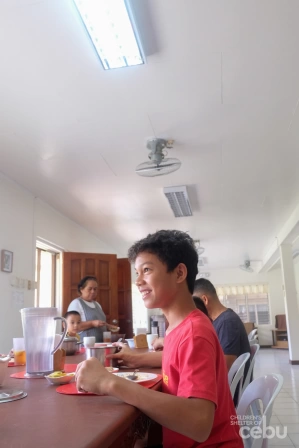
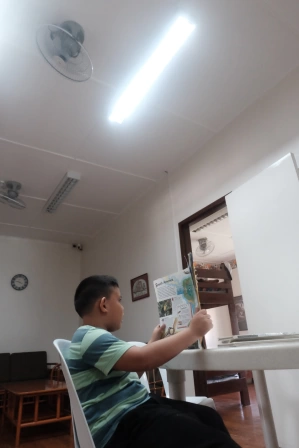
For the children, the newfound brightness serves as a symbol of hope, a reminder that even in the darkest of times, there are those who care enough to bring light into their lives. The simple joy of being able to read a book without straining their eyes is a blessing that many take for granted.
Seeing the smiles of the children motivates us to undertake more works and activities that not only improve the physical environment but also uplift the spirits of those who call this place home, one light tube at a time.
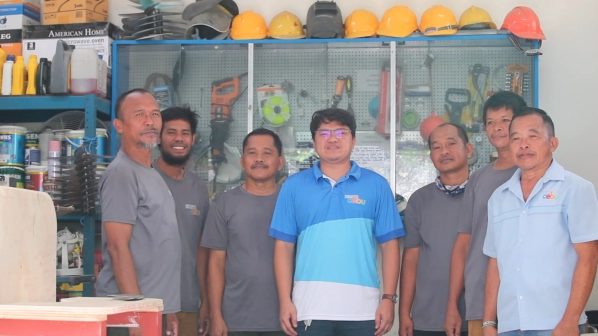
Easter Celebration at CCHS: A Joyful Time of Togetherness and Introspection
At Cebu Children of Hope School, Easter isn't just about chocolate and colorful eggs – it's a time for friendly
competition, laughter, and unforgettable memories. This year's Easter celebration was no exception, as
students, teachers, and staff came together for a day filled with thrilling games and challenges that brought out
the competitive spirit in everyone.
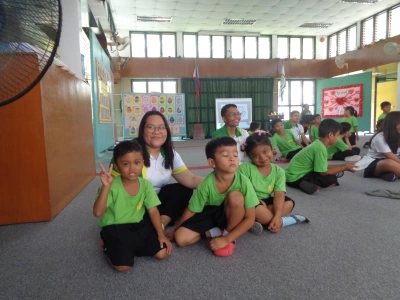
Dancing and Singing Songs:
Easter songs sounded in the big room as students gathered for a special assembly to start the day off. We sang songs that spoke of hope, resurrection, and renewal, which filled our hearts with the spirit of the occasion. The environment was infused with energy as students and teachers performed lively dances with an Easter theme, showcasing their inventiveness and enthusiasm after the upbeat music.
Discovering the Significance of Easter:
It was essential to pause among the celebrations and consider Easter's more profound meaning.
Students learned about Easter's biblical and historical background through lively discussions and
interactive video presentations. Easter tells the account of Jesus' resurrection, which helps people
appreciate and value our holiday more deeply.
Easter Arts and Crafts:
Creativity was blooming as students engaged in various Easter-themed crafts and activities. Each activity allowed self-expression and artistic exploration, from coloring eggs to designing eggs. These hands-on experiences not only sparked imagination but also encouraged students to feel fulfilled.
Egg Blowing Contest:
The Egg Blowing Contest followed, where competitors tested their lung capacity in a match of breath and skill. Competitors tried to blow their eggs across a marked finish line using only a hollowed-out egg and unwavering resolve. Cheers broke out as the eggs raced through the floor, driven only by the competitors' breath. Everyone was on the edge of their seats throughout the entertaining and exciting Egg Blowing Contest.
Walking Eggs Contest:
It was the Walking Egg Contest, which tested participants' balance, coordination, and willpower. Using spoons held in their mouths, participants carefully balanced eggs as they made their way through an obstacle course. The contestants' constant fear of losing their precious cargo made the competition much more suspenseful. As competitors crossed the finish line with their eggs remarkably intact despite the odds, the crowd cheered them on.
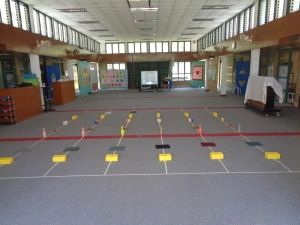
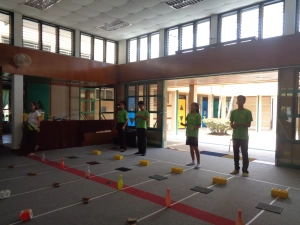
Prize or Challenge:
Inside each egg, an enjoyable task or a treasured prize awaits everyone, heightening the celebration's mystery and excitement. Rewards might be anything from candies to tiny trinkets. On the other hand, challenge activities allow kids to work on tasks that promote creativity, confidence, and collaboration.
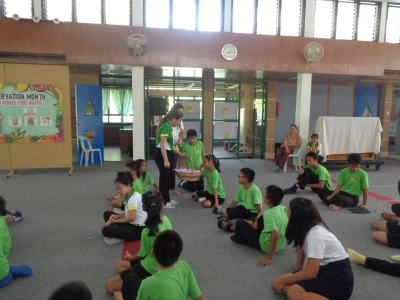
As the time began to end on another memorable Easter celebration at CCHS, laughter echoed through the air and smiles lit up the faces of all who participated. Through games and challenges that tested skill and spirit, we came together as a school community to celebrate the joy and camaraderie that define this particular time of year. As we reflect on the day's festivities, let us carry the spirit of Easter with us – a spirit of fun, friendship, and boundless enthusiasm.
Happy Easter from all of us at Cebu Children of Hope School!
Life and Living
A couple of weeks have passed since Easter, but the joy of the season still lingers on at CSC. During the Easter season, we celebrate forgiveness, reconciliation, renewal, and rebirth. On Resurrection Sunday, we revel in the new life we have been born into thanks to Christ's victory over sin and death. A new life; one that is defined by life, love, and living, and one that has an opposite trajectory to the life we had been living before. As you can imagine, this holiday holds very special meaning at CSC. At CSC, faith, love, forgiveness, renewal, rebirth ... new life ... are at the core of everything we do.
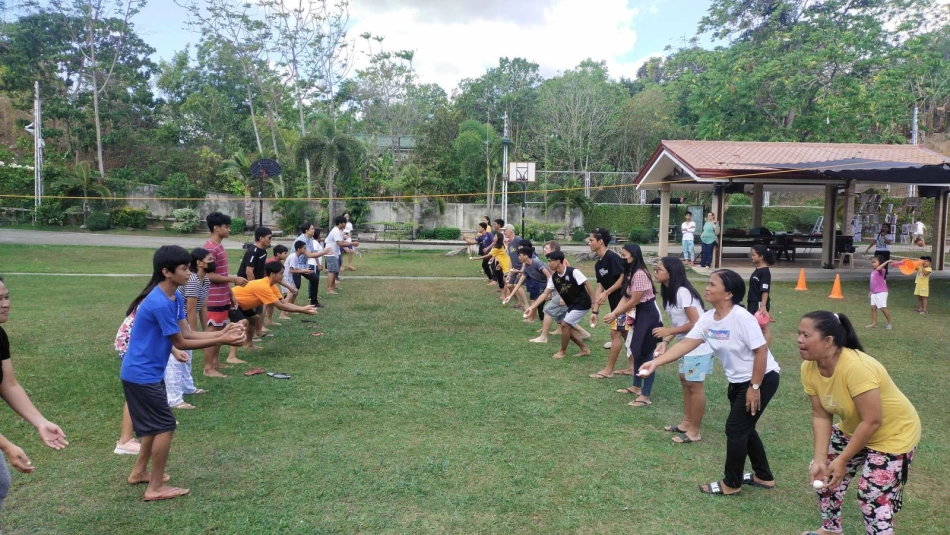
To celebrate the season, we use many symbols and, of course, have a ton of fun doing it. After church, a massive Easter Egg Hunt sends the kids running across the big field between the homes, searching inside of plants, pots, and dark corners. It's tons and of fun, and we explain how the eggs are meant to symbolize new life and living. The fact that they're hollow eggs made of plastic is meant to symbolize the empty tomb where Jesus' lay; a tomb which is empty because He is Risen! And the hunt? Well, that's just meant to be fun and goofy, and the smiles and laughter filling the Shelter make the effort of hiding the eggs completely worth it.
Aside from the Easter Egg Hunt we also play fun games, like an art and coloring contest to showcase our kids' talents, and an egg toss for a little fun competition. The little ones used hard-boiled eggs for their games to make it a little easier for them, and I admittedly might have eaten a hard boiled egg or two while watching.
It's been two weeks now since Easter Sunday, but the feeling still lingers on. Not only is life marked by joy and happiness at CSC, it is also marked by renewal and rebirth. CSC is a place of a healing and growth, where children are able to heal from past hurts and grow past them, finding a new life that is no longer defined by their history or circumstances, but instead by who God has made them to be. I love Easter, and I love the fact that we can tangibly express the very meaning of Easter in everything we do.
"Therefore, if anyone is in Christ, he is a new creation. The old has passed away; behold, the new has come." (2 Corinthians 5:17)
"Eureka" Moments
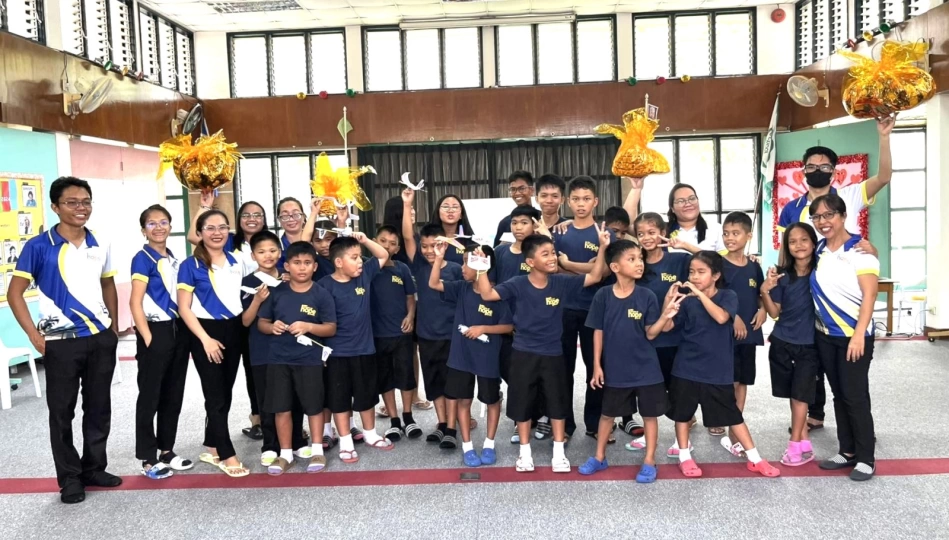
The Science and Math Culminating Activity at Cebu Children of Hope School was an incredibly enjoyable event where students could showcase their passion for science and math through a day filled with thrilling challenges and learning opportunities. Students were divided into two teams—the Einstein and Galilei teams—and they were enthusiastic about engaging in activities that tested their knowledge and teamwork skills.
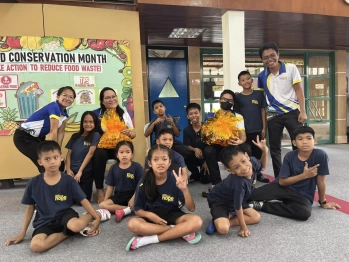
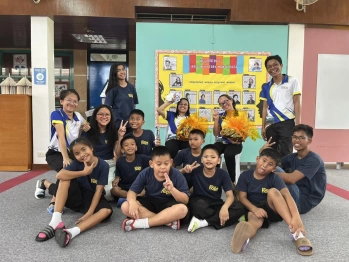
The morning session started with entertaining math games that not only sparked healthy competition but also fostered a strong camaraderie. Each level required one student to achieve five correct answers, showcasing their quick thinking and problem-solving abilities. Teams cheered each other on, creating a vibrant atmosphere of unity and collaboration. The math relay further emphasized the importance of teamwork, as students had to combine their mental and physical abilities to navigate obstacles and solve problems.

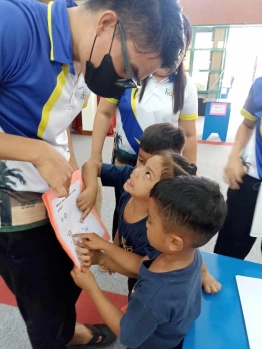
The afternoon was dedicated to science, offering students a platform to unleash their creativity and critical thinking skills. They conducted experiments that ranged from crafting bird flyers to attempting the floating egg challenge, exploring the principles behind flight and buoyancy. The 'Protect the Egg' challenge was a testament to their understanding and problem-solving skills, as teams had to devise innovative ways to safeguard an egg using only limited materials.
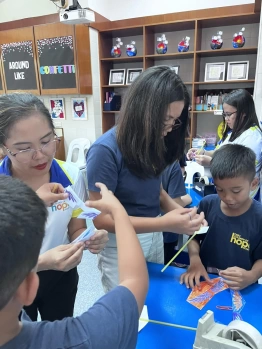
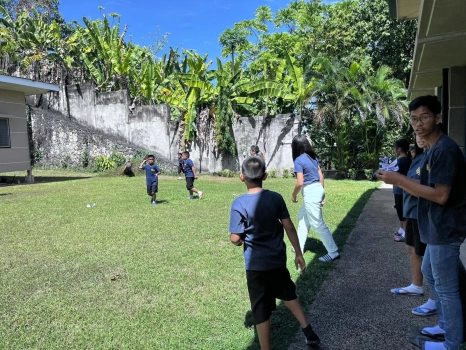
Throughout the event, students learned about renowned scientists like Einstein and Galilei, after whom the teams were named. Prizes were given to the students, and everyone felt proud of their accomplishments.
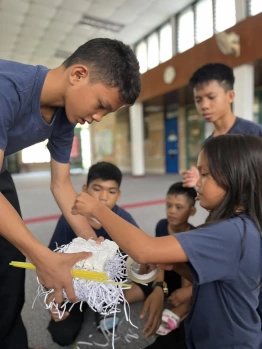

The Science and Math Culminating Activity was a blast. It showed everyone how fascinating science and math can be when fully engaged. Kudos to the students and teachers for making it such a memorable day!




